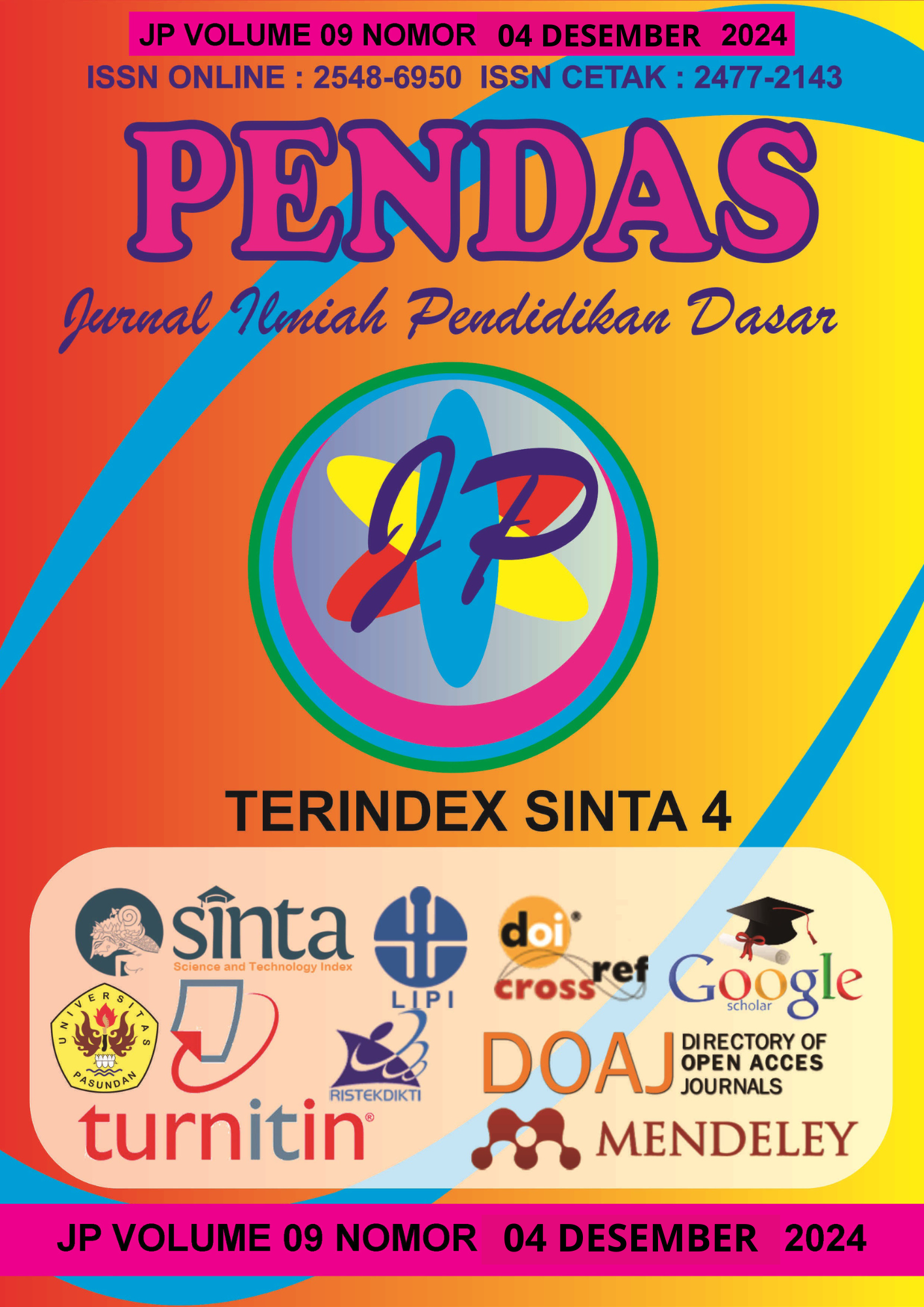IMPLEMENTASI PENDEKATAN STEM PADA KURIKULUM MERDEKA DI SDN 215/X BUKIT TEMPURUNG TANJUNG JABUNG TIMUR
DOI:
https://doi.org/10.23969/jp.v9i04.20729Keywords:
STEM approah, merdeka curriculum, 21'st Century Learning, primary schoolAbstract
This study aims to analyse the implementation of the STEM approach in the Merdeka Curriculum at SDN 215/X Bukit Tempurung, East Tanjung Jabung, with a focus on the learning process, supporting and inhibiting factors, and the impact on student learning outcomes. A qualitative approach with a case study method was used in this research. Data were collected through observation, interviews with teachers and principals, and documentation of the implementation of STEM-based learning. The results showed that the implementation of the STEM approach succeeded in increasing students' involvement in learning, especially in project-based activities that integrate science, technology, engineering and mathematics. However, the main supporting factors include the use of local resources and teacher creativity, while the main challenges are limited teacher training and adequate facilities. The positive impact of STEM implementation was seen in the improvement of students' critical thinking, creative and collaboration skills. In addition, teachers also showed increased innovation in designing lessons. This research suggests the need for continuous training for teachers and improved facilities to optimise STEM implementation. This approach is in line with the objectives of Merdeka Curriculum, which aims to create creative, critical, and collaborative learner profiles
Downloads
References
Ardiansyah, R., Diella, D., & Suhendi, H. Y. (2020). Pelatihan pengembangan perangkat pembelajaran abad 21 dengan model pembelajaran project based learning berbasis STEM bagi guru IPA. Publikasi Pendidikan, 10(1), 31.
Chai, C. S., Rahmawati, Y., & Jong, M. S.-Y. (2020). Indonesian science, mathematics, and engineering preservice teachers’ experiences in STEM-TPACK design-based learning. Sustainability, 12(21), 9050. https://doi.org/10.3390/su12219050
Creswell, J. W. (2014). Research Design: Qualitative, Quantitative, adn Mixed Methods Approaches. (4th ed.). SAGE Publications, Inc.
Dubek, M., Rickey, N., & DeLuca, C. (2024). Balancing disciplinary and integrated learning: How exemplary STEM teachers negotiate tensions of practice. School Science and Mathematics, 124(4), 249–265. https://doi.org/https://doi.org/10.1111/ssm.12645
Fauzi, W. N. A. (2024). Implementasi Program Merdeka Belajar dalam Meningkatkan Kualitas Pendidikan di Sekolah Dasar. Al Banin: Jurnal Ilmiah Pendidikan Dasar, 1(1), 68–86. https://doi.org/https://doi.org/10.51614/albanin.v1i1.453
Heru, H., & Yuliani, R. E. (2020). Pelatihan pengembangan bahan ajar multimedia pembelajaran interaktif berbasis pendekatan saintifik menggunakan metode blended learning bagi guru smp/mts muhammadiyah palembang. Jurnal Pengabdian Pada Masyarakat, 5(1), 35–44.
Herwanti, K. (2022). Pengembangan Keterampilan Berpikir Kritis dan Kreatif Melalui Pendekatan STEM Untuk Meningkatkan Hasil Belajar Kimia pada Materi Sel Elektrokimia. TRISALA: JURNAL ILMIAH PENDIDIKAN, 8(3).
Kemendikbud. (2020). Kurikulum Merdeka: Pedoman Implementasi di Sekolah Dasar. In Kementerian Pendidikan dan Kebudayaan RI.
Kurniawan, A., Yanti, H., & Abdurrahman, A. (2023). Menajemen kurikulum merdeka belajar dalam menerapkan nilai-nilai kearifan lokal pada pembelajaran di SD Negeri 16 Meulaboh-Aceh Barat. Jurnal Ilmiah Profesi Pendidikan, 8(4), 1927–1935.
Maryanti, E., Suminar, T., & Ellianawati, E. (2023). Development of Ethno-STEM E-Module with Project Based Learning Model Based on Yogyakarta Local Wisdom to Improve Student’s Creative Thinking Abilities. International Journal of Research and Review, 10(10), 105–114.
Miles, B., Huberman, A. M., & Saldana, J. (2014). Qualitative data analysis: A methods sourcebook. SAGE Publications.
Nazhifah, N., Wiyono, K., & Ismet, I. (2023). Development of STEM-based e-learning on renewable energy topic to improve the students creative thinking skills. Jurnal Penelitian Pendidikan IPA, 9(11), 9575–9585.
Oktaviah, F. N., Dwiyanti, A., & Barumbun, M. (2023). Integrated STEM-based Teaching Modules with the Values of Pancasila Student Profiles in Supporting the Implementation of Kurikulum Merdeka in Primary School. Jurnal Ilmiah Sekolah Dasar, 7(3). https://doi.org/10.23887/jisd.v7i3.57198
Putri, Y. E. E., Lesmono, A. D., & Ismanto, I. (2020). Hasil Belajar Siswa Sma Pada Pembelajaran Fisika Menggunakan Model Problem Based Learning (Pbl) Dengan Pendekatan Stem (Science, Technology, Mathematics and Engineering). Jurnal Pembelajaran Fisika, 9(4), 147–151.
Rehman, A., & Butt, I. H. (2020). Elementary School Female Students’ Attitude towards STEM. Journal of Business and Social Review in Emerging Economies, 6(2), 511–515.
Ridlo, S. (2020). Critical thinking skills reviewed from communication skills of the primary school students in STEM-based project-based learning model. Journal of Primary Education, 9(3), 311–320.
Rif’at, M., Sugiatno, S., Suratman, D., Yusmin, E., Fitriawan, D., Siregar, N., & Rianto, V. M. (2024). STEM dalam merdeka belajar sebagai salah satu strategi pembelajaran matematika. Jurnal Anugerah, 6(1 SE-Articles), 1–10. https://doi.org/10.31629/anugerah.v6i1.6383
Sırakaya, M., & Alsancak Sırakaya, D. (2022). Augmented reality in STEM education: a systematic review. Interactive Learning Environments, 30(8), 1556–1569. https://doi.org/10.1080/10494820.2020.1722713
Sugiyono. (2019). Metode Penelitian Pendidikan (Kuantitatif, Kualitatif, Kombinasi, R & D dan Penelitian Pendidikan). Alfabeta.
Torra, L., Berg, N., Henrik, L., Stephan, B., & Wamsler, S. (2024). Exploring the Impact of EdTech Tools on STEM Learning Outcomes in Swedish Schools. International Journal of Education, Science, Technology, and Engineering (IJESTE), 7(1 SE-Articles). https://doi.org/10.36079/lamintang.ijeste-0701.730
Vieira, D. F., Barbosa, F. P., Fruett, F., & Swart, J. W. (2024). School 4.0-Hands on Project Based Learning in STEM and The INCT NAMITEC Network. 2024 IEEE Latin American Electron Devices Conference (LAEDC), 1–4.
Widodo, Y. B., Amri, M., Yustitia, V., Dwyarthi, N. D. M. S., Oktavio, A., & Dirsa, A. (2024). The Effectiveness of the STEM-based Differentiation Learning Model on Merdeka Curriculum Learning Outcomes. Indonesia Journal of Engineering and Education Technology (IJEET), 2(2), 173–181.
Downloads
Published
Issue
Section
License
Copyright (c) 2025 Pendas : Jurnal Ilmiah Pendidikan Dasar

This work is licensed under a Creative Commons Attribution 4.0 International License.














































